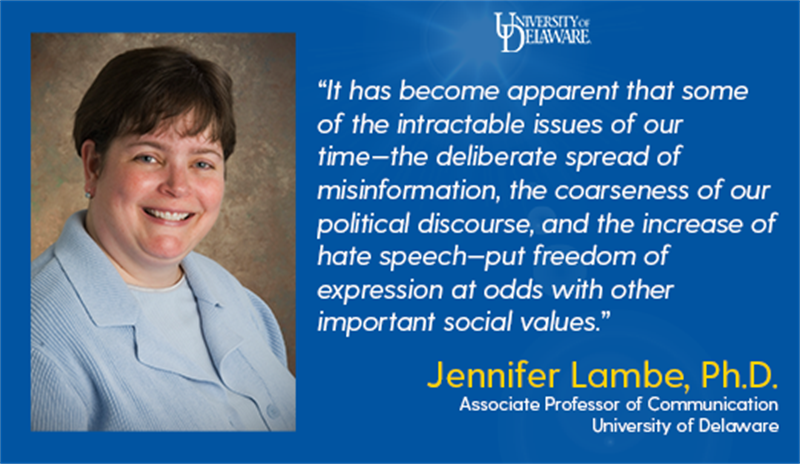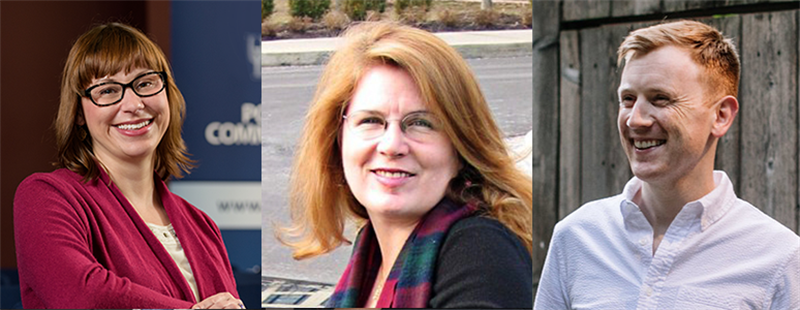UD Faculty Advance Civil Discourse
Expertise spans constitutional rights, media, identity, rhetoric, and psychology

In an era of social, cultural, and political divides, the University of Delaware’s social and political scientists have a singular focus—to advance the conversation. Dr. Jennifer Lambe, associate professor of communication at UD, exemplifies this goal. Since 2015, Lambe has been hosting free speech programs for the UD community, bringing to campus nationally recognized scholars, legal experts, non-profit leaders, and journalists to discuss issues related to the First Amendment.
Currently, Dr. Lambe is developing the Initiative on Free and Responsible Expression (I-FRE), with a mission to conduct research and engage the public about issues where free expression conflicts with other important values. Initial areas of emphasis include hate speech, misinformation, and the quality of public discourse. “The initiative formalizes work our faculty have been doing so we can maximize and grow its impact,” said Lambe. “It has become apparent that some of the intractable issues of our time—the deliberate spread of misinformation, the coarseness of our political discourse, and the increase of hate speech—put freedom of expression at odds with other important social values. I-FRE starts from the premise that free expression is essential to democracy, but that the harms which sometimes result must be addressed in creative ways that maintain a commitment to free expression for everyone involved.”
UD’s civil discourse experts share common interests in public opinion, American electoral politics, messaging, identity, free speech, media, and psychology. Their research is nationally recognized in academic journals and the media. The following list highlights their research interests and initiatives, and includes links to their curricula vitae, websites, and news stories.

Associate Professor and Director of Legal Studies Program
Political Science and International Relations
- Specializes in American law, with a focus on constitutional law, the First Amendment, and election law.
- Research examines the intersection of America’s two-party system and constitutional law.
- Teaches and researches constitutional law, civil liberties, the First Amendment, election law and comparative constitutional law.
Benjamin Bagozzi, Ph.D.
Associate Professor, Director of Internships, and Director of Graduate Admissions
Political Science and International Relations
- Specializes in political methodology and international relations.
- Interests include environmental politics, international political economy, and the study of intra and international political violence.
- Teaches and researches computational social science, text analysis, event data, and the analysis of rare events.
Erin Cassese, Ph.D.
Associate Professor, Political Science and International Relations
Read Conspiracy and Gender .
- Research explores the behavior of women as voters and candidates for political office in the United States.
- Studies partisan conflict with an emphasis on psychological processes such as dehumanization.
- Teaches courses on public opinion, political psychology, and social movements.
Juliet Dee, Ph.D.
Associate Professor, Department of Communication
- Research focuses on mass media and the law, including the First Amendment.
- Studies media liability for copycat violence, investigating lawsuits in which plaintiffs sued various media outlets, claiming the media “incited” violence in real life.
- Additional work includes First Amendment law and reporter’s privilege as well as the portrayal of women in advertising.
- Co-authored the textbook, Mass Communication Law in a Nutshell.

Lindsay Hoffman, Ph.D.
Associate Professor, Communication
Director, National Agenda Series
Read Thinking Big
- Co-chair of the “Voting and Civic Engagement Steering Committee” in Student Life; coordinates voting and engagement initiatives and gets feedback from campus stakeholders.
- Research centers around political communication, including how people use and process political information as well as the effects of such use, and how politicians manage media.
- Interests include media technology and politics, including how people use new media to get involved politically; public opinion, specifically how perceptions of public opinion influence attitudes, thinking, and behaviors; and political entertainment, such as the effects of viewing programs like “The Daily Show” on knowledge and political participation.
Campus initiatives
- Hosts Election Central every four years since 2008, with panels, games, trivia, and live media coverage of returns.
- Free Intelligent Conversation sponsored activities.
- Living Room Conversations sponsored activities.
- Faculty advisor of Students Advocating for Political Awareness and Let’s Talk registered student organizations.
- Presented Difficult Conversations video to high school and college students.
Tracey Holden, Ph.D.
Assistant Professor, Communication
- Hosted Now Hear This UD!, an annual public-speaking competition for students. Themes focused on civic engagement and emphasized presentation and discussion of public issues.
- Leadership of the Middle East Partnership Initiative.
- Focus on oral communication, public speaking and business communication.
- Interests include rhetoric in an election cycle, organizational and political communication, especially the American military.
- Other interests include social movements such as Black Lives Matter and the Arab Spring and leadership, particularly female leadership.
- Also interested in civic engagement and strategic business communication. civic leadership, and intercultural advocacy.
Philip E. Jones, Ph.D.
Associate Professor, Political Science and International Relations
Read Bringing Insight to LGBTQ Politics
- Research focuses on LGBT politics, public opinion, voter behavior, and representative democracy.
- Research includes public opinion towards transgender people, policies and candidates.
- Interested in how small groups function and succeed within a democracy.
- Researching political diversity among LGBTQ Americans; mainstream society’s support for LGBTQ rights; and factors that affect public support for transgender identity.
- Teaches public opinion, campaigns and elections, and parties and interest groups

Jennifer Lambe, Ph.D.
Associate Professor, Department of Communication
Founding Faculty Member, Center for Political Communication
2020-2021 Fellow with the University of California’s National Center for Free Speech and Civic Engagement (Read Dr. Lambe’s interview about the fellowship)
Read Preventing Hate Speech and The Speech Divide
Events and Initiatives
- Voices Audio Essay Contest, 2017 to present, encouraging students to present 2-4 minute personal stories about social and political themes on a public platform.
- Developing the new Initiative on Free and Responsible Expression (I-FRE) at UD, which supports research and public engagement about issues where free expression conflicts with other important values. Areas of emphasis include hate speech, misinformation, and the quality of public discourse.
- Co-coordinated an interdisciplinary research papers workshop through the Institute for Humane Studies on “Building Trust through Free Expression” (October 2020) Resulting papers being developed for an edited volume of the same title.
- Hosted and organized 3-day symposium, Speech Limits in Public Life: At the Intersection of Free Speech and Hate national symposium (March 2019). Three-day conference featured four keynote speakers and 15 panelists from a variety of academic disciplines and non-government organizations.
- Organizes free speech programs each spring and fall since 2015. The fall events are aligned with National Freedom of Speech Week during the third week of October. Past speakers include Alex Amend, Southern Poverty Law Center: Wabach College’s Democracy and Public Discourse Initiative; Kara Swisher, technology journalist; Jonathan Friedman, PEN America director; and Safa Al Ahmad, Saudi Arabian journalist.
- Assisted University of California Merced in planning its inaugural free speech week programming and presented the kick-off session.
Research and Interests
- Interests in communication and democracy, freedom of expression, hate speech, media ethics, and media effects.
- Specializes in First Amendment rights, specifically free speech and free press.
- Examines media issues: ethics, media effects, impact of the media on children, regulation of the Internet and regulation of broadcasting.
- Theme of research is the tension between media freedom and accountability. Lambe approaches it from the liberal perspective that minimizing government involvement in media accountability is ideal, understanding that the power and pervasiveness of media in contemporary culture cannot go unchecked.
- Researching best practices for balancing free speech and diversity in higher education.
Joanne Miller, Ph.D.
Associate Professor
Joint appointments in Political Science and International Relations and Psychology and Brain Sciences
Read Conspiracy and Gender and Making Her Mark.
- Research centers on political psychology, with an emphasis on political propaganda, misinformation and conspiracy theories.
- Explores which groups are more likely to believe conspiracy theories, how and why these ideas manifest themselves and the danger they pose to society.
- Expertise in public opinion and polling.
- Teaches courses on research design, quantitative methods, political psychology, political propaganda, and misinformation and conspiracy theories.
- Dr. Miller’s research has been funded by the National Science Foundation and the Pew Charitable Trusts and has won awards from the following American Political Science Association sections: Elections, Public Opinion, and Voting Behavior, Political Communication, and Political Organizations and Parties.
- She has published in journals such as the American Journal of Political Science, the Journal of Politics, Political Psychology, Public Opinion Quarterly, and American Politics Research.
David Redlawsk, Ph.D.
Chair of Political Science and International Relations Department James R. Soles Professor
Read Partisanship Over Moral Values and
From Passion to Career in Politics
.
- Political psychologist who studies voter behavior and emotion.
- Research focuses on how voters process political information to make their decisions and their emotional responses to campaign information.
- Interested in political psychology, emotion, and decision-making.
- Has written several books on politics, worked behind the scenes on campaigns and ran for local office — winning and losing as a member of both major parties.
- Teaches courses on political campaigning, voting behavior, political psychology, decision making, and experimental methods.
- Author or editor of nine books and has published more than 50 articles and book chapters. His newest books are the Oxford Encyclopedia of Political Decision Making, for which he is Editor-in-Chief, and A Citizen’s Guide to the Political Psychology of Voting , with UD Ph.D. student Michael Habegger (2020, Routledge).
Danna Young, Ph.D.
Associate Professor, Communication and Political Science and International Relations
Watch Dr. Young’s 2020 TED Talk on the Psychology of Political Ideology.
- Distinguished member, National Institute for Civil Discourse Research Network at the University of Arizona.
- Received Robert M. Entman Award in Democracy and Political Communication in April 2021 from the School of Media and Public Affairs (SMPA) at The George Washington University, for excellence in political communication research.
- Co-edited A Crisis of Civility: Political Discourse and its Discontents in 2019, summarizing civility research across various disciplines.
- Published Irony and Outrage: The Polarized Landscape of Rage, Fear, and Laughter in the United States in 2020, examining consumption of media about American politics from historical and psychological perspectives.
- Studies the intersection of entertainment and information, including the effects of shows like The Daily Show with Jon Stewart and The Colbert Report.
- Researches non-traditional forms of political information, mis- and dis-information, motivated reasoning, and strategies for belief correction.
